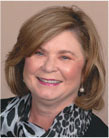
This Is Mentoring!



When I was asked to be part of a three-member panel to teach a mentoring workshop at CMSA’s 30th Annual Conference & Expo, I was excited. I thought this will be an important opportunity to share insights on mentoring and provide information to professionals who have talent, leadership skills and the drive to take their careers to the next level.
I was told that I would be sharing the stage with Deanna Cooper Gillingham and Jeanine Zukerman, two colleagues I know and respect. This made the opportunity even more exciting. As we worked together to develop the agenda, I knew that the program would be successful, as we each came from different experiences that would provide a range of information attendees could use well after they left the conference.
As I thought about what I would contribute, I realized that I was the senior member of the team and had a great deal to share. I have had a wonderful career which took me into many different directions that allowed me to grow professionally and personally. The missing link for me was that I never had a true mentor. I think having a mentor I could talk to from time to time would have helped me to be more focused, allowing me to understand the educational opportunities I should consider and what the benefit of choosing one path vs. another would offer.
Today, many young professionals look at having a mentor as part of their professional development. They know they need direction, and they seek it from different people they meet throughout their careers. Those who do seek a mentor make informed decisions on what they want to do and how they will get there. It is a wise decision to have a mentor and carve a path that allows you to use your skills, your education and unleash the passion that you have for your chosen career.
It is an exciting time for professionals starting out or those ready to move beyond the bedside. Healthcare is in a state of disruption. Being in a state of disruption usually means that innovation will follow. It is a perfect time for new thoughts, new opportunities and new career directions for those who are willing to take a chance.
Working with a mentor whom you can bounce ideas off of and who can share insights and provide thoughtful ideas can be of great value as you move through your journey.
I realized that mentoring was something that I would be good at, as I have seen a lot in my career and love to connect people. I realized that mentoring could be a new career option for me. I am looking forward to seeing where it takes me!
NOW LET ME TURN THIS OVER TO MY FRIEND AND COLLEAGUE DEANNA COOPER GILLINGHAM RN, CCM. DEANNA IS THE CEO OF THE CASE MANAGEMENT INSTITUTE®. IN HER SECTION SHE SHARES INFORMATION ABOUT HOW MENTORING IS MORE THAN ORIENTATION AND PRECEPTORSHIP.
Mentoring is more than orientation and preceptorship. These focus on processes and procedures and have their place within an organization, ensuring employees are trained to fulfill their job duties. But mentorship goes beyond policies, procedures and the “job.” It focuses on the whole person and their career.
Mentorship is built on the relationship between the mentor and mentee and has the potential to create leaders. The best mentors see untapped potential in a colleague and help to develop that potential. They will challenge them to go outside of their comfort zone while providing encouragement, support and direction that guides the mentee to grow into their full potential.
The most successful mentor-mentee relationships occur when there is a connection between the two individuals, where the mentor truly cares about the success of the mentee and the mentee values the support of the mentor. This creates a sense of accountability to each other, making it more likely for each individual to do their part.
But mentoring does not have to be one on one. In fact, there does not even have to be a personal relationship.
After speaking at a conference, I was approached by a young lady who introduced herself as my mentee. To say I was shocked was an understatement. I had never met her before, but I had noticed she listened intently as I spoke. As we talked, I began to understand how I had been her mentor. She had followed me on social media, read my book and was a member of my online community. Even though I had never met her, she knew me, and I had made an impact on her and her career.
A short while later, there was a post on my online community for case managers by a woman who was the new director of case management for her organization. She was thanking the community, stating she would never have accepted the position without the support and encouragement she received from the group. They had given her advice and direction as a new case manager and encouraged her to accept the interim director role. During her time as interim director, she had sought and received guidance from the group, and now she felt prepared to accept the position as director. This encouragement did not come from any one person, but from the supportive group as a whole. The group had mentored her.
This made me think of some of my mentors. Although I had had many traditional mentors throughout my career, I realized I also had mentors I had never met. These were people I looked up to, was inspired by and had me think differently than I had before I “met” them. I realized they were my virtual mentors.
There is something special about the traditional mentor-mentee relationship. But I would like to invite you to also look at nontraditional ways to mentor and be mentored.
NOW WE TURN TO THE THIRD MEMBER OF OUR TEAM, JEANINE ZUKERMAN, RN, BSN, CCM, DIRECTOR OF CLINICAL INNOVATION, MTI AMERICA. JEANINE WILL SHARES INSIGHTS ABOUT HOW MENTORS ARE THE KEYS TO PROFESSIONAL GROWTH AND DEVELOPMENT.
When we explore the importance and meaning of mentorship, I reflect on my early personal experience with a dynamic mentor. Mentorship is key to finding new opportunities and experiences. If you’re lucky, you’ll have a life-long friend and supporter.
“Ja-nine, Ja-nine,” my name was being called across the conference room floor by a voice with a powerful Irish brogue. The resonance of this voice demanded my attention. Before our eyes would meet, I would recognize the voice of this alpha female from my past. As she reached to embrace me, Cynthia shouted with joy, “I knew you were a diamond in the rough… the one who would take the nursing cap off and think like a businesswoman.” This was Cynthia’s interpretation of the qualities of a good case manager.
Although we lost contact many years prior to my move from Pittsburgh to Orlando, Cynthia and I were interconnected by an unspoken mentorship bond and a mutual respect for our individuality.
Cynthia, a tiny powerhouse of woman, was my first mentor to case management. As my mentor, Cynthia demonstrated the strength of wisdom and integrity. She is deeply rooted with the understanding that the keys to success in life are persistence, skill, discipline and humility. Cynthia mentored me and her entire hospital case management staff of twenty, like a rock in the middle of a storm. She stood tall to confront challenges of administrative conflicts and was loyal yet demanding of her mentees. She advocated for unwavering devotion to professional development and excellence. As a full-time director of case management and mother of seven children, she led and encouraged others through example. Her case management mentees were mandated to grow professionally through education, certification and ongoing relationship building.
The foundation of our intertwined relationship came before the mentorship. Cynthia first identified me as a good mentee based on my character, not my novice competency. Always willing to teach, train and inspire others, she knew the ingredients for mentorship success would be based on mutual respect and chemistry.
This genuine inter-collegial mentor-mentee relationship was the foundation to my true professional love of case management. After many years of practice, I now find myself using several of Cynthia’s strategies and idioms when I work with mentees. Mentorship is a great way to develop a succession plan to carry to carry out our life’s work.
SIX QUALITIES OF A GOOD MENTOR:
- Good mentors are a positive influence; they guide with wisdom, integrity and maturity.
- Mentors are excited about your career path and build confidence and encourage professional growth through professional organizations, self-learning and conference participation.
- Mentors must have the ability to establish a mutually trusting professional relationship.
- Strong mentors recognize the most impressionable teachable moments may follow not success, but a failure.
- Mentors should actively engage with multidisciplinary professions and open doors for introductions and networking opportunities for your mentees.
- Great mentors seek out the novice mentees and identify the curious eager minds.
Thank you for reading. We hope to meet you in Boston at the CMSA Annual Conference & Expo.
Authors’ Note: At the writing of this article, we are in the midst of the COVID-19 pandemic. We are not sure if this workshop or the conference will take place. Regardless, we hope this article provide insights into a how a mentor could help you as you move forward in your careers. Enjoy the ride!
